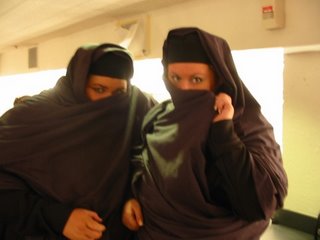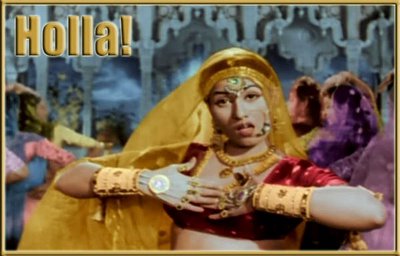"
Mind, Math, Meaning and Metaphor:
Reflection on the Crisis of Science and Religion in the 'Post Modern' Age of Neuroscience."
Reflections on a lecture by Noel Gardner, M.D.
the last time i left work in the middle of the day was when my buddy James graduated from the U. since that was over a year ago, i think it's reasonable to state that i very rarely leave work at lunchtime, and if i do, it's for a good reason. which is why it's so strange that i was gone for two hours today to go to a psychiatry Grand Rounds Lecture. i didn't know where i was going (the VA Hospital, Building 9 Auditorium? like i know where that is??) i had to argue w/ the bus driver, take an inconvenient shuttle, walk three blocks, got lost inside VA Building 14 -- twice, and then i found the right building, talked to the secretary and managed to sneak into the lecture just as the intro was over. all of this is even weirder when one considers that i'm not actually, technically, invited to Grand Rounds lectures. they're for psych residents and doctors and stuff. i sometimes go to Chromosome Grand Rounds but only 'cause someone i know is speaking. i'v never even heard of Dr. Gardner.
obviously i went anyway. it was one of the many flyers and announcements in the elevator at work. i work in the U of U School of Medicine building. since residents hang out in my part of the hospital, the elevators' back wall is covered w/ papers telling said students when Grand Rounds are, which ones have been cancelled, and where to call if you are a sexually active woman between the ages of 18 and 40 and would like to be a part of a herpes vaccine study. for this particular lecture to catch my eye every day for a week is strange. since i'm a strange person, i talked to my boss, clocked out, and went to the talk.
it was exactly what i needed. there was a ridiculous amount of material to cover so Dr. Gardner not only went over his allotted time but didn't quite get to finish his stuff, but it was still cool. i sat in the back taking ferocious notes, and i'm fairly certain i missed at least one vital point while writing, but i still learned a lot. anyway, i'll start to summarize now.
OUR CURRENT WORLD VIEW (remember i got there late so i don't know why this was being talked about. i just started writing.)
We are cursed with Human Freedom -
animals work by instinct. if you have seen the movie "March of the Penguins" you'll know about the amazing trek these animals take -- 70 miles over ice -- in order to mate and bring up another generation of penguins. all these things are hard-wired into animals. humans, however, have self-awareness and frames of reference. we have to grow up, learn about our environment, make choices. this generates the extitiential dilemma we are all familiar with -- more on that later
Social Construction of Reality (Berger or Bergen's idea) (i can't read my writing)-
we create a world view in order to give life meaning and predictability. religion is one of those things which helps us make certain of the chaos around us. the hurricane that just hit the coast is a terrible thing. but, if your religious world view includes natural disasters as just one of those things expected at the End of Days, then you're more likely to shrug off the horror of such an event as natural and reasonable. we create implicit frames of understanding, which means patterns of behavior which we consciously or unconsciously follow. example of this is someone who perceives herself as a "victim". she will work hard to repeat this pattern, no matter how self-destructive, because it's perceived as being a predictable pattern, or "safe". religion is, in a cultural anthropological sense, one of those explanatory models. the stories, myths, and rituals form the social construction we work within. Labor Day is one such ritual. it doesn't really have much meaning to us these days, but we continue the ritual because it's established, predictable, and safe. plus it's nice to have a day off.
Philosophy -
philosophy is an explicit frame (vs. an implicit one). it seeks to explain the world and examine the world views currently being held. Natural philosophy, which was originally based on theories about the world, evolved into science. Moral philosophy discusses ethics, politics, and practical life. this is what i think of when i hear the word philosophy.
Religion and the Supernatural (ultimate claims)-
religion serves three functions: a social function, an intellectual function, and a personal function. if your spouse goes to church and since you enjoy chatting with your buddies there and the odd game of bingo, you go as well. you don't pray, you don't change your life, but you do utilize religion as a social outlet. theologians, on the other hand, think about religious mysteries. they ponder stuff, and generally, after years of seminary and graduate work, they don't really believe in God or pray or attend church. religion is an intellectual outlet and one they interact with on an academic basis. a personal function, meaning feeling connected or spiritual, can be experienced by persons not formally involved with any particular religion. they are an example of personal religion without any connection to the social or intellectual aspects.
Everyone has a world view and each individual world view determines how we relate to our culture and each other. generally we gravitate towards those who have a similar world view to our own. however, because of the great "American Experiment" we often interact with those who have a different world view than our own. Imagine immigrants coming over to this country, through New York, and moving onto the same street together. on one block you may have someone from India who has never met anyone who isn't Hindi, an Irishman who's never known anyone who wasn't Catholic, and a Muslim who's never interacted with anyone not Muslim. because of close proximity of world views, we are immersed in an environment where world views are chosen rather than handed down. if everyone is everything, then religion and world views become a deliberate choice.
CURRENT CLASH OF CULTURES
Political Polarazation -
contrasting world views make it hard to communicate and compromise. this is evident in current discussions such as abortion. when does life, when does 'personhood' begin? because of different frames, the communication breaks down and everyone just thinks their opponents are horrible terrible people. this applies to most of our polarized issues. when should life end? the Terri Schaivo lawsuit awakened the nation to this issue and had senators arguing. stem cell research is similar to abortion -- when does life begin? gay marriage and parenting? evolution vs. intelligent design?
Radical Religious Fundamentalism -
we are currently experiencing a rise in radical religion. while this is characteristic in a monotheistic religion, it's not just Islam. the prime minister of Israel wasn't assassinated by a Palestinian, he was murdered by a radical fundamentalist Jew.
SOME BACKGROUNDThere are two dominant forms of Western Culture. they can be boiled down/brought back to two persons; Plato and Aristotle. Plato argued a concept called Idealism. he said that reality is determined not by material stuff but by ideas. the pure abstract is the foundation and reason of everything. (In the beginning there was The Word?) Plato distrusted perception and emotion. emotion is variable and our senses can be fooled. therefore they are useless as a means of garnering information and Truth. Plato maintained that the individual person has an inherent divine sense of truth and knowledge within and those truths can be found through deep thought and deductive reasoning. the ideal society for Plato was an authoritarian class structure which functioned under a philosopher king.
Plato was a very good teacher, though, because his student Aristotle thought entirely for himself and thought entirely different things. Aristotle is known as a Realist and he believed that only the material universe can be considered reality. of course, the Divine was needed to "First Cause" the world to exist but, after that, God is pretty much hands off and wants us to figure stuff out. Aristotle maintained that perception and observation is the only way to learn and Inductive Reasoning (i.e. considering ALL the evidence and not just the bits you like) was the only sure way to come to truth. (this concept is the foundation of our Scientific Method.) Aristotle was NOT into authoritarian ways of existence, mainly because there's no reason to believe what some king says is true if your own observations prove it false.
as a culture, western society tends to veer between these two concepts.
THREE ERAS OF CIVILIZATION
there are three general eras of world views, Pre-, Modern, and Post-, and they all correlate generally to periods of time. these epochs refer to the general ways of understanding our world.
PRE MODERN (Antiquity to 1776)
Encompassing the Dark Ages, the explanatory model of the time was grounded in magic causes. hurricaines aren't caused by cold air and warm water, they're caused by angry gods. things at this time were understood though mystical insight and divine revelation. because of this, socital structures were linked together under the spiritual elite (shaman, priests) who were the only ones with any knowledge of why/how the world worked. all truth was determined by this elite and concensus was found by obedience and conformity. it was a time of great certainty. if you were a heretic (which means "to choose") and you choose another way than the one determined by society, then your social, financial, physiological, and even eternal welfare was at risk.
Judeo Christian Pre Modernism -
Anthropological history says that religion developed in this way: animism > polytheisim > henotheism > monotheisim > ethical monotheism. animism is where everything around you, everything in nature contains the Divine (which means you'd better be careful when killing stuff!). polytheism removes god from the immediate surroundings and posits many gods. henotheism is where there are a lot of gods but MINE is the best/nicest/can beat up your god. monotheism is just one god. ethical monotheism is a new twist on things. it means that there is one god and he has a set of values which is independant of my wishes/thoughts/beliefs. and, one day i'll have to go up and answer to this god to see if i measure up against His standard. Christianity mixed ethical monotheism with Greek gnostic/neo Platonic ideas. and, thanks to some emporors and stuff, it became the state religion. one god, one religion. St Augustine synthesized the various facets of Christianity thoughout the world into Christinized Neo Platonism. this is the hallmark of the Dark Ages. knowledge and society were static, esoteric, authoritarian, stratified, and monistic. ideas ruled rather than people. all knowledge was controlled by the church. art reflects
ideals of humanity rather than the sweaty fleshy person of reality. Salvation came not through metaphor and symbols but literal authoritarian structure. when taking Communion, it's not a symbol but the ACTUAL flesh and blood. (yuk!) the transition to Modernism started with Aquinas, who talked of the Greek ideals like they were at least if not more important than the Bible. that led to the Renaissance, the Reformation, and the Enlightnment (which starred Descartes [doubt everything] and Newton [apples don't fall just 'cause God told 'em to.]) it was the blossoming of the Individual over the Ideal. this is obvious in art and its when we started seeing actual people being painted.
MODERN (1776 - 1945)
Dr. Gardner choose the birth of the United States as the beginning of the Modern period because it was the first great example of Modernist thought. Modernism is based on an explanatory model which seeks physical causes rather than magical ones. it belives in Deity and because of God's involvement, seeks to understand an ordered universe. Truth is found through observation and experiment. It was the end of arbitrary authority and instead supported a society based on individual rights. there was a tremendous optimism and confidence built into Modernism. Science, reason, and human progress were seen as a delightful inevetable. the transition from Modernism to Post Modernism was begun by religious pluralism, Darwin, Freud, Marx, Einstein, and Kierkegaard. all of those modes of thought showed that the universe is chaotic, variable, and uncertain which led Kierkegaard to have the first exetential crisis -- or at least to invent the term
POST MODERN (1945- present)
pessismism about science and technology (how great can it be if it causes pollution, disease, and atomic warfare?) and general loss of the Supernatural in life (God is Dead) led to the Post Modern funk. if there is no god, reality is only and exclusively physical. there's no obvious meaning to life. the only meaning we have is emotional, and therefore irrational. This way of thinking generated a lot of social alienation through the absence of shared symbols and metaphors. it also led to moral relativism and a distinct loss of moral certainty. within this void we have discovered that certainty, whether emotional or whatever, is important -- even if it can't be proved scientifically.
RELIGIOUS FUNDAMENTALISM -- THE QUEST FOR PRE MODERN CERTANTYthe general reaction to Post Modern thought was one of fear, horror at the loss of meaning and certainty, and anger. because of this inability to deal with the uncertain, religious fundamentalism represents a "line drawn in the sand" or a place where, in spite of reason or logic, the belivers will not pass. because of this defensive attitude there is a complete refusal to compromise. to compromise would be to abandon the refuge constructed to protect one from the vagueness of existance. the basic beliefs of most fundamentalist groups are: the original world was perfect and we need to go back to that perfect time, absolute truth demands absolute obedience, and truth was given to us by God and what was anciently written and understood to be metaphor is now, in a very Modernist sense, considered to be FACT. ( they say "we'll prove it! check out our website!" a curious blend of the "legitamacy" of scientific thought mixed with non-logical principles.)
THE UNEXPECTED ATTRACTION TO FUNDAMENTALISM
fundamentalism gives people moral certainty in the face of despair. it gives someone individual purpose in the midst of extitential meaninglessness. it offers the promise of an apocalyptic release from a bad/degraded/rotten/destructive society. it gives the follower a sense of belonging and, most importantly, it offers a reprieve from personal choice. "An Escape From Freedom" is the phrase Dr. Gardner used.
WHERE WE ARE TODAY
in the Pew Survey, which was completed last week, it found that 42% of Americans believe that everything has existed in the form it currently now has since the beginning of time. (good luck getting evolution into the schools!) 60% of Americans belive the Bible to be the LITERAL word of God (rather than metaphors and parables for teaching.) and 60% of them feel religion is more important to their overall world view than science. is it a nation seeking after a Pre Modern world view in a Modern way, and they're all seeking for certainty.
WHERE DOES NEUROSCIENCE FIT INTO ALL OF THIS? (Dr. Gardner was already out of time by this point, which was sad 'cause this is the place he wanted to get to the whole time.)
Neuroscience, or the study of how our brains are hard wired for different things, is the great frontier of this century. everything we as humans do is based on brain activity. religion, memory, motor skills, everything is part of the electrical storm in our skulls. Neurophilosophy is studying/discussing the biological basis for our morality. we humans are hard wired for attachment and communication of that attachment to each other, to understand meaning best from metaphor, to experience and exercise empathy. religion is part of the brain and therefore a part of the human experience. religion is a metaphoric activity.
WINE AND WINESKINS
Dr Gardner took a metaphor from Jesus Christ to explain this concept. he said that old wineskins get dried out and crack under the weight of wine. therefore we need new wineskins to hold the same wine. the wine, Gardener says, is the same thing all the prophets and teachers have told us from the beginning. the wine is empathy, compassion, understanding, love. the wineskins, however, are the metaphors and models we use to understand and apply these principles. then he talked a lot about Ghandi, who said that in a hard situation,
we must be the change. Gardner said that faith isn't in the certainty of fundamentalism. faith is trusting in the uncertain. faith is in the connections between us all. then he reminded us of a scripture "Be Mature -- even as my Father and I are mature.", and went on to say that our growth, our deveopment, our maturty through this process of life is really only optimal when done in the face of uncertainty. religion is an opportunity to communicate and learn new metaphors to understand the uncertain. he told a story about a dean of medicine giving graduating students a pin which read "Don't Be Too Sure" because it was the best gift he could give them. when doctors are certain, when they disregard facts that don't fit or seek the comfort of assurance, is when they make the worst mistakes. as a society we need to become better accquainted with the uncertain and unsure. we need to find a new expression of faith and connection. the survival of the speceis may depend on it.




 These are my friends hanging out in their Egyptian dresses. Note: no veil. The costumer loves them more.
These are my friends hanging out in their Egyptian dresses. Note: no veil. The costumer loves them more. Here are my buddies, the Friendly Neighborhood Terrorists. I tease them a lot 'cause they're wearing wrestling belts. There's a lot of "Can you smell what Dave is cooking!!!" going on backstage...
Here are my buddies, the Friendly Neighborhood Terrorists. I tease them a lot 'cause they're wearing wrestling belts. There's a lot of "Can you smell what Dave is cooking!!!" going on backstage...








